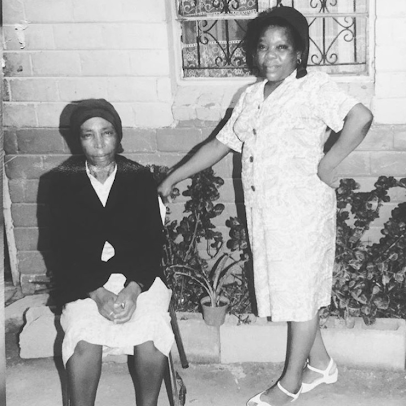Gogo’s Tongue: Grandmother as Griot
11.29.22

As a call and response to the work of African feminist scholar, Babalwa Magoqwna (2018)––I have created a sonic meditation on Julie Dash’s film; Daughters of the Dust (1991). Magoqwna’s profound teachings on “umakhulu” have provided such rich grammar on why the role of the grandmother is integral for Black survival and aliveness (Kevin Quashie).
In the chosen image stands my grandmother (Norah Nomthandazo Dube) with a cheeky hand on her hip whilst her mother (Merica Msweli) remains seated.
This mix is a culmination of all my loves, which I have synthetized into this audiovisual experience ––a space for sonic and visual reckoning. I have merged both film and music in order to try and tell a story that is still unfolding. This story is of being Black in the diaspora and ancestral memory as a radical technology for Black survival. The story is told by the people who have birthed me. I was raised by my grandmother and I have been hearing her teachings on umsamo (the ancestral altar) louder than ever. Ancestral memory is something I constantly find myself fascinated by, for what does it mean for me to remember those who not only lived before me but further continue to evade materiality? If we are to create relevant scholarship in Black diasporic knowledge systems, we have to also consider the metaphysical in the constitution of power, and pay attention to the ways in which spirituality informs the process of indigenous knowledge production
Julie Dash is a filmic guide who communicates this beautifully in Daughters of the Dust (1991). In this opening scene, the matriarch of the family Nana Peazant teaches her grandson Eli about his relationship to those descended Africans, the middle passage and the rememory (Toni Morrison) that has structured their family’s survival. Whilst Eli believes that his progress and expansion lies with his migration to the north, grandma Peazant cautions him that the very thing that he is trying to abandon might just be the very thing that sustains him and survives his migration. Finally, I end the mix with a Black feminist interpretation of Alfred Hitchcock’s film; Lifeboat (1944). I was struck by Canada Lee’s recitation of Psalms 23. His performance in this scene communicates the affective power of Blackness. He transformed a minor role into a transcendent scene. I am still sitting with and listening closely to his story. His performance in this scene, allows me to contemplate the complicated relationship between Blackness and Christianity. If you watch Daughters of the Dust, you will discern how Dash is able to provide a sophisticated exploration of this very theme. I am no Christian but Psalms 23 is a poetic divination that continues to sustain me. Right next to my impepho (sage) lies the holy bible, a cup of water with a silver coin and my grandmothers picture. All of it sustains me.
TRACKLIST:
Percy Tau–Kamo Mphela
Stolen goods– The Lowkeys
Phezulu– Nobantu Vilakazi, White Lion, and Yumbs
uLazi– 9umba and Mr JazziQ
eBUSUKU–Young Stunna
Zwonaka– DBN Gogo, Dinho, and Mellow & Sleazy
Bopha– Felo Le Tee and Mellow & Sleazy ft Young Stunna, Madumane, Dj Maphorisa
Izitha– Nkosazana Daughter ft Mpura, Zaba, Tee Jay, Sir Trill, ThackzinDJ & Josiah De Disciple
Umama Akekho– Nkosazana Daughter ft DJ Maphorisa and Soa Mattrix, Soulful G, Sir Trill
Mali Mali– Kabza De Small, DJ Maphorisa, TRESOR
Abalele– Ami Faku, DJ Maphorisa, and Kabza De Small
Idlozi Lami– DJ Maphorisa, Soa Mattrix Soulful G, Sir Trill ft Phila Dlozi, Boohle & Kabza De Small
Bibliography:
Magoqwana, Babalwa. “Repositioning uMakhulu as an Institution of Knowledge” in Whose History Counts: Decolonising African Pre-Colonial Historiography, edited by. Bam, June, Lungisile Ntsebeza, and Allan Zinn, 75-89. Stellenbosch, South Africa: African Sun Media, 2018.
Morrison, Toni. Beloved: a Novel. New American Library, 1988.
Quashie, Kevin. Black Aliveness, or a Poetics of Being / Kevin Quashie. Duke University Press, 2021.
Seward, Adrienne Lanier, and Justine Tally. Toni Morrison : Memory and Meaning / Edited by Adrienne Lanier Seward and Justine Tally. Edited by Adrienne Lanier Seward and Justine Tally, University Press of Mississippi, 2014.








